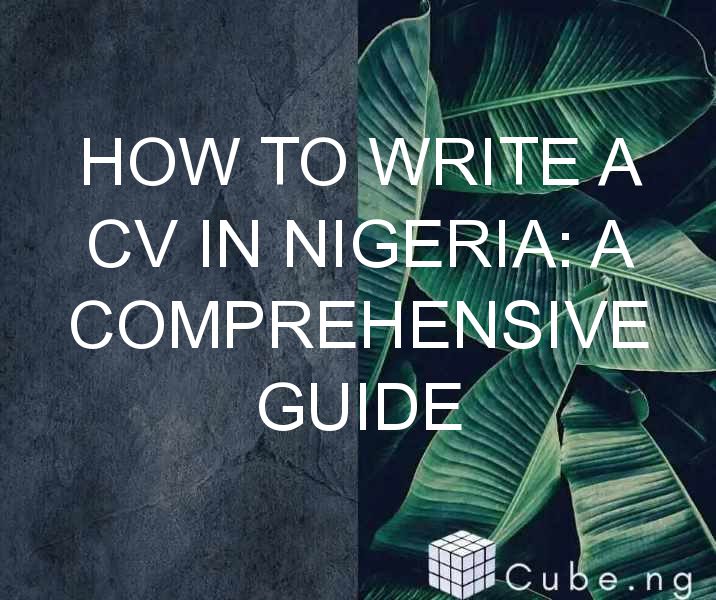If you are looking for a job in Nigeria, or anywhere else in the world, a well-written CV is crucial. It is the first impression you make on potential employers, and it can be the deciding factor in whether or not you get an interview.
In Nigeria, the job market is highly competitive, and a well-crafted CV can help you stand out from the crowd. This guide will take you through the steps of writing a CV in Nigeria that will get you noticed by recruiters and hiring managers.
Table of Contents
- Step 1: Understand the Purpose of a CV
- Step 2: Choose the Right Format
- Step 3: Include Personal Information
- Step 4: Write Your Personal Statement
- Step 5: Outline Your Education
- Step 6: Highlight Your Work Experience
- Step 7: Showcase Your Skills
- Step 8: Include Your Hobbies and Interests
- Step 9: Check for Spelling and Grammar Errors
- Conclusion
- FAQs
Step 1: Understand the Purpose of a CV
Before you begin writing your CV, it is important to understand its purpose. A CV, which stands for Curriculum Vitae, is a document that outlines your education, work experience, skills, and achievements. Its purpose is to showcase your qualifications and convince potential employers that you are the best candidate for the job. A CV should be tailored to the specific job you are applying for, highlighting the skills and experiences that are most relevant to the position.
Step 2: Choose the Right Format
There are several CV formats to choose from, including chronological, functional, and combination. The chronological format is the most common and is organized by date, starting with your most recent experience. The functional format focuses on your skills and accomplishments, with less emphasis on your work experience. The combination format is a mix of both chronological and functional, highlighting both your work experience and skills. Choose the format that best suits your experience and the job you are applying for.
Step 3: Include Personal Information
Your CV should begin with your personal information, including your full name, address, phone number, and email address. You can also include your LinkedIn profile and any other relevant social media profiles. Make sure your email address is professional and appropriate for a job search.
Step 4: Write Your Personal Statement
The personal statement, also known as a career objective or summary, is a brief paragraph that summarizes your career goals and objectives. It should be tailored to the job you are applying for, highlighting your skills and experiences that are most relevant to the position. Make sure it is clear, concise, and impactful.
Step 5: Outline Your Education
List your education in reverse chronological order, starting with your most recent degree or qualification. Include the name of the institution, the degree or qualification earned, and the date of graduation. If you have any additional certifications or training, include those as well.
Step 6: Highlight Your Work Experience
List your work experience in reverse chronological order, starting with your most recent job. Include the name of the company, your job title, the dates of employment, and a brief description of your duties and accomplishments. Use action verbs and quantify your achievements to make them more impactful.
Step 7: Showcase Your Skills
In a separate section, list your skills and abilities that are relevant to the job you are applying for. These can include technical skills, such as proficiency in Microsoft Office, as well as soft skills, such as communication or leadership. Use bullet points and be specific about your skills and how they can benefit the company.
Step 8: Include Your Hobbies and Interests
While not necessary, including your hobbies and interests can help to personalize your CV and showcase your personality. Choose hobbies and interests that are relevant to the job you are applying for, such as volunteering or participating in a professional organization.
Step 9: Check for Spelling and Grammar Errors
Before submitting your CV, make sure to proofread it for spelling and grammar errors. Use online tools, such as Grammarly, to help catch any mistakes. Ask a friend or family member to review it as well, as a fresh set of eyes can catch errors that you may have missed.
Conclusion
Writing a CV in Nigeria can be overwhelming, but by following these steps, you can create a document that highlights your qualifications and gets you noticed by potential employers. Remember to tailor your CV to the specific job you are applying for, highlight your skills and experiences, and proofread for errors. With a well-written CV, you can stand out from the competition and land your dream job.
FAQs
What is the ideal length of a CV in Nigeria?
- A CV in Nigeria should be no longer than two pages.
Does my CV need a photo?
- It is not necessary to include a photo on your CV in Nigeria, but some employers may request it.
Should I include my salary expectations on my CV?
- No, it is not necessary to include your salary expectations on your CV in Nigeria.
Are there any specific keywords I should include on my CV?
- It is helpful to include keywords from the job description on your CV in Nigeria, as many employers use applicant tracking systems to scan resumes for relevant keywords.
Can I use a template for my CV?
- While using a template can be helpful, make sure to customize it to your own experience and the job you are applying for.




